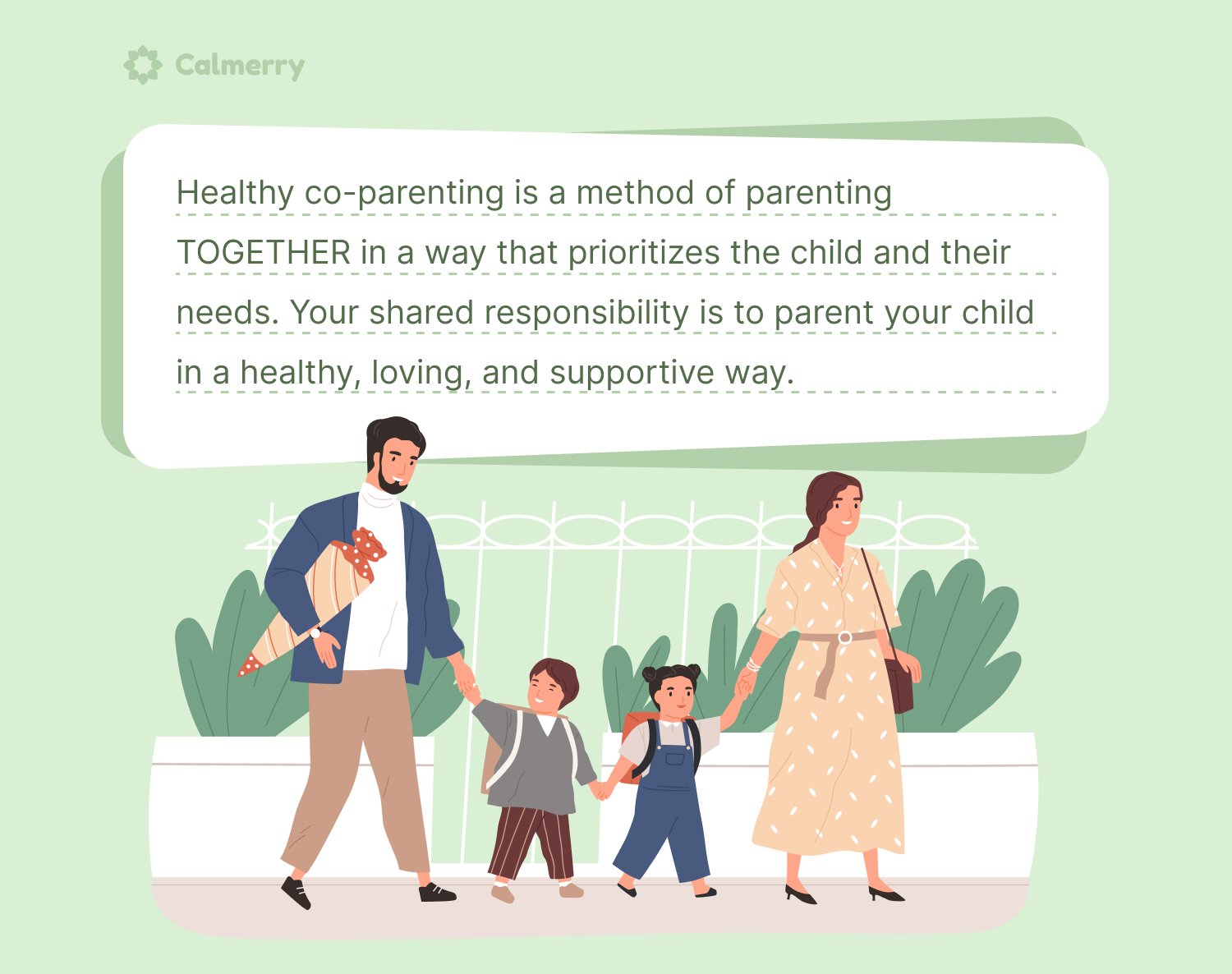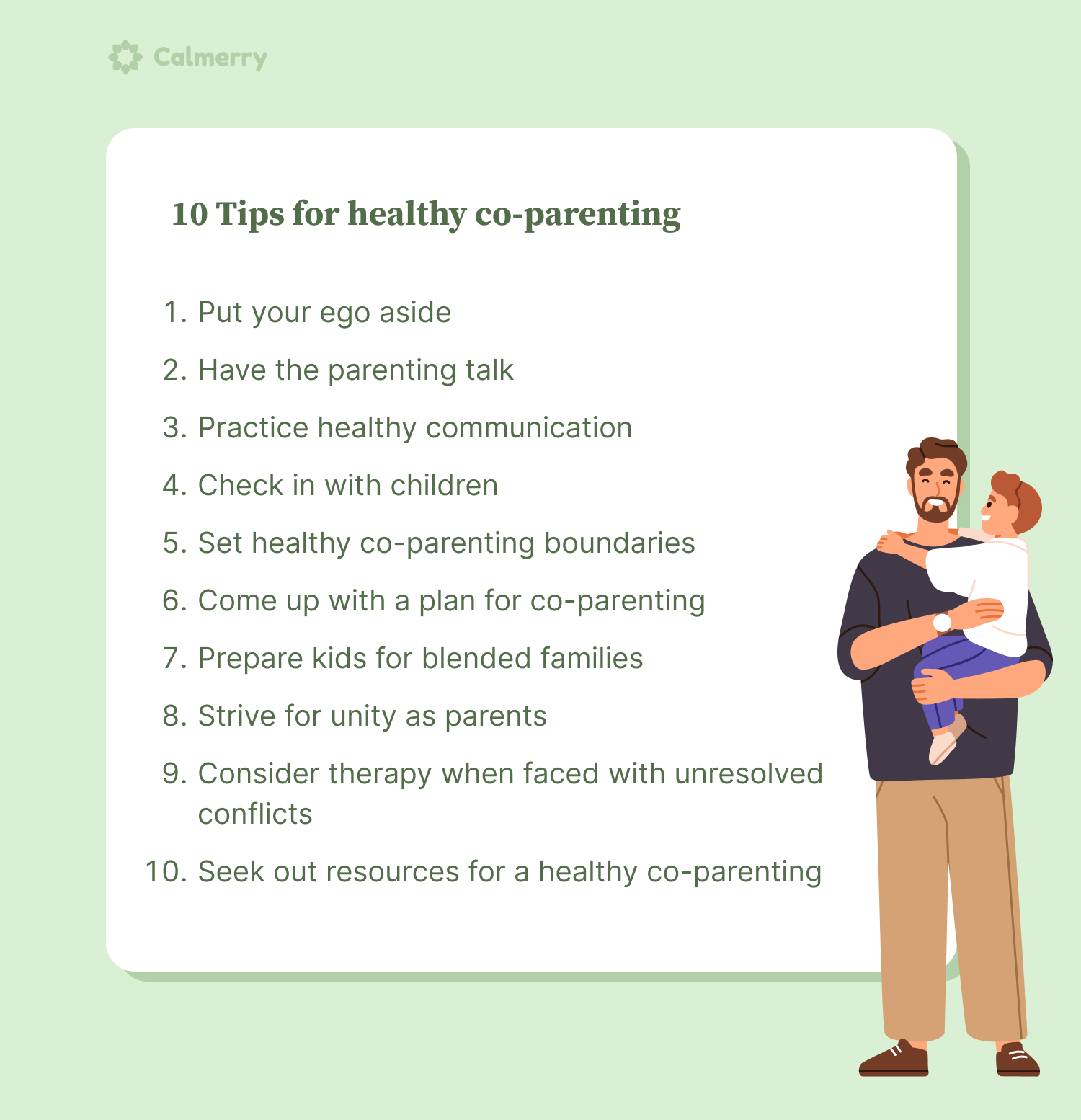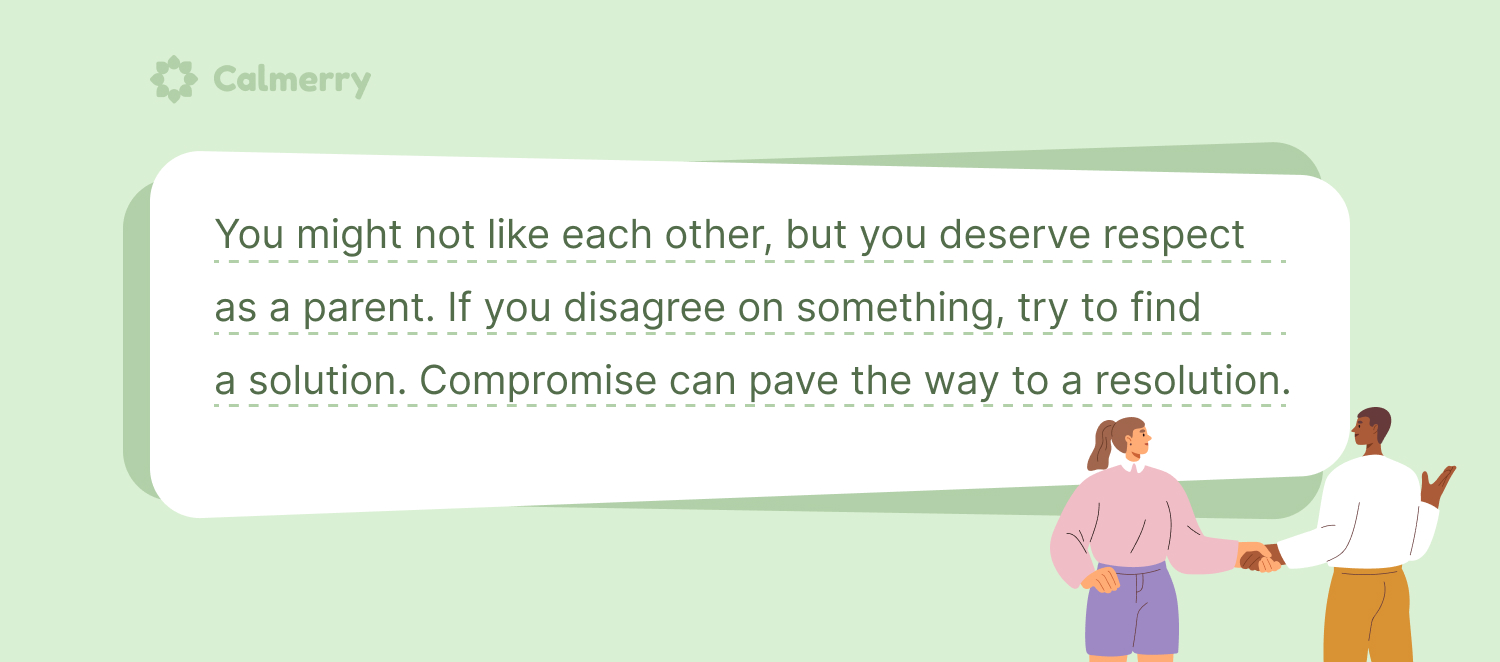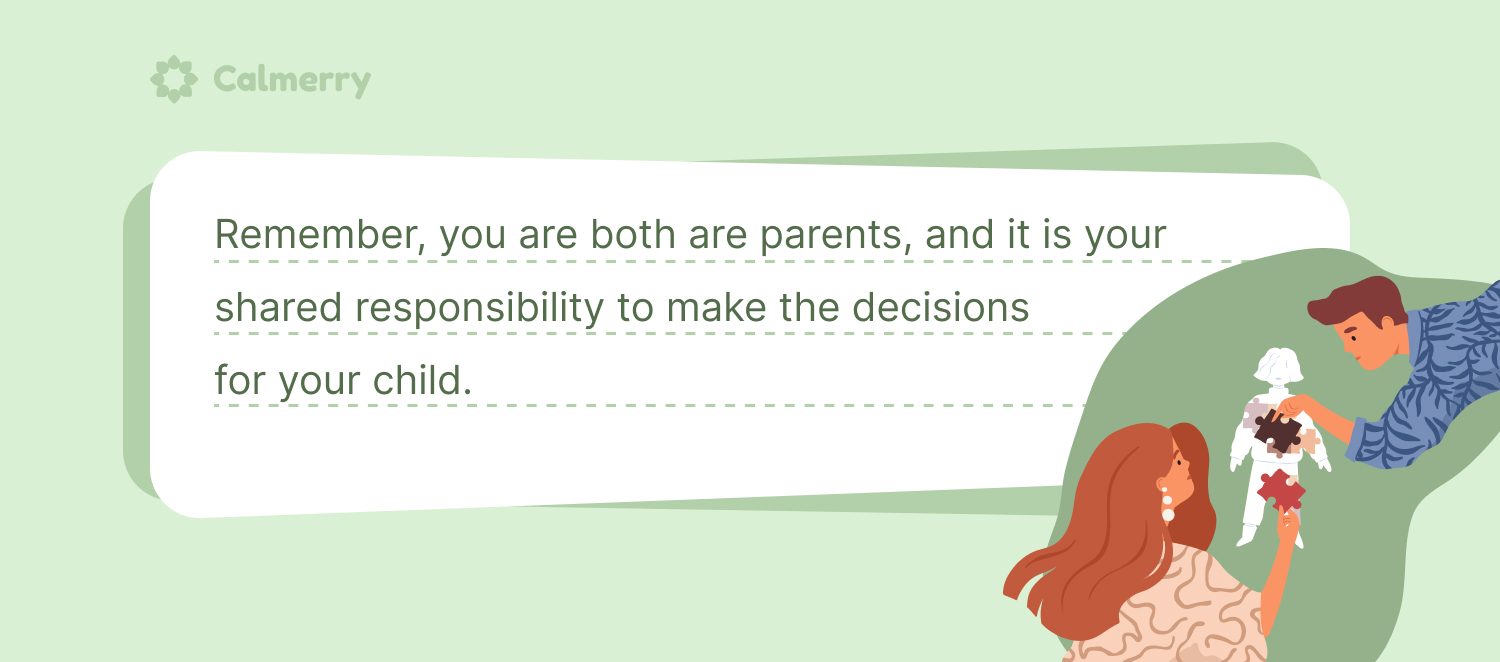The Art of Co-Parenting: 10 Tips for Making It Work Even When It Seems Hard

In this article
When you became parents together, the idea of co-parenting – or even how you’d parent – probably never crossed your mind. But here you are.
Raising kids is, at the same time, one of the hardest and most important tasks you’ll ever take on. Your parenting choices directly impact the most important person in this process – your child. You and your co-parent are your child’s earliest role models, and they will learn so much from you about navigating the world.
Your child means the world to you. But what happens when you and your child’s other parent don’t see eye to eye, or worse, you can barely be in the same room together?
The fact is, it doesn’t have to be a reason for not parenting your child well. You can co-parent successfully even in the most strained relationships. But just what is co-parenting, and how can it help?
What is co-parenting?
Strictly speaking, co-parenting is the shared parenting of a child within a defined set of boundaries and expectations. It is most often associated with parents who are not together, but parents who together have to learn to parent as a team too.
Even parents who otherwise get along well sometimes disagree on parenting practices. Who’s right? Who’s wrong? How do you decide?
Healthy co-parenting is a method of parenting together in a way that prioritizes the child and their needs. Your shared responsibility is to parent your child in a healthy, loving, and supportive way.
Co-parenting is an art and a skill. It’s all about creating that healthy dynamic between you as parents and with your child.

How to co-parent – 10 tips for healthy co-parenting
Sometimes it can feel like a tall mountain to climb, especially if you and your co-parent barely agree on anything. It’s not about being “right” or making the other parent do anything.
The secret sauce for successful co-parenting is to keep your child’s best interest at the forefront of your decisions and look for ways to foster a positive dynamic between you. And there are things you can do to support that goal.
These tips for co-parenting can help you get started.

1. Put your ego aside
Co-parenting is all about your child and what’s in their best interest. It’s about choosing the best course of action that will help your child grow up feeling secure and loved. Sometimes, that means doing the hard things.
Your child deserves the best of both of you. You don’t have to like your parenting partner, but maintaining a cordial relationship goes a long way.
2. Have the parenting talk
Co-parenting might have never been on your radar till now. What does it mean to you? How do you envision it unfolding? Chances are, you each have different ideas of what parenting looks like and different parenting styles.
What your parenting will look like also depends on your child’s age. Infants and young children need a lot of attention and care. As they move into adolescence, their needs will change, and what they need from you will change too.
How you parent your child will change as your child grows. It’s a discussion you’ll need to have more than once. Working together will help you make good decisions for your child at every age.
3. Practice healthy communication
Clear, non-defensive, healthy communication and cooperation between parents is critical to your success. Things change, and stuff happens. Keep each other in the loop. Keeping things from each other or just “forgetting” to share something important does nothing to foster a healthy relationship.
You might not like each other, but you deserve respect as a parent. If you disagree on something, try to find a solution. Compromise can pave the way to a resolution.

4. Check in with children
Be mindful of communicating with your kids and of what they are exposed to. Divorce and the inevitable changes that come can shake their sense of security. Witnessing arguments, being exposed to a grown-up business, and chaotic schedules can be scary and confusing for kids.
Doing things that create a negative image of their other parent or making your child a messenger doesn’t score any points either. It might feel good to “one up” the other parent, but it does not serve your child well. And in the long run, it might create a broken bond and unresolved feelings that can affect them well into adulthood.
Take time to check in with them. Monitoring how they’re doing can alert you if they need support and help guide your decisions too. When kids know mom and dad are handling things well, it lessens their fears and allows them just to be kids, avoiding parentification.
5. Set healthy co-parenting boundaries
Being loose with your plan or with boundaries is confusing for everyone and the quickest way to ignite a conflict with your ex-spouse or partner. Healthy co-parenting boundaries respect each parent’s role and pave the way for healthy decision-making.
It may be tempting, but trying to “make” your co-parent do it “your way” or intruding on their visitation time will undermine your parenting relationship.
Boundaries also extend to other family members, new love interests, and your child’s caregivers too. Seeking support is one thing. Pulling others into the mix is something else.
There’s an old saying that “too many cooks in the kitchen spoil the pot.” Remember, you are both are parents, and it is your shared responsibility to make the decisions for your child.
6. Come up with a plan for co-parenting
Co-parenting requires a lot of coordination and planning. You can’t plan for every little thing, but you can make plans for the big things – custody, child visitation schedule, handling health issues, etc.
You’ll also need to figure out how you will keep each other informed about schedules, school or sports events, or those day-to-day things that come with having kids. This is especially important for parents who might be geographically distant from each other.
You don’t want to be the parent who only calls when things are on fire and demands, “Do something about this!”. Not only does that set each of you up to fail, but it also sends conflicting messages to your child.
7. Prepare kids for blended families
If you’re not together, the odds are that either or both of you will be in a new relationship at some point. You may think your new love is just the best thing ever. And they might be.
You and your child’s other parent are the decision-makers. That can be confusing, especially for a young child, and it isn’t fair to the new partner(s) or your co-parent. However, it’s important to remember that they are not your child’s parent and shouldn’t be placed in that role.
Blending families can be hard on kids. Help them prepare for what’s to come.

8. Strive for unity as parents
Structure and set boundaries give kids a sense of security and help guide them as they learn to make good decisions. Two households, two sets of expectations, or loose boundaries create stress and confusion for them. Most parents would agree that kids seem to have radar for which parent will allow what.
Inconsistency also sends a message that you don’t really mean what you say or, even worse – a perception that mom or dad is “nicer” (meaning let’s me do what I want). It sets you both up for conflict too, which is unfair to either you or your child.
Kids are quick learners. What do you want to teach them?
9. Consider therapy
Sometimes, no matter how hard you try, it just feels like you’re getting nowhere but frustrated. Some situations require more than what you might be able to handle on your own:
Co-parenting is not likely to work well when dealing with someone who may be controlling or narcissistic. A narcissist’s need to control makes boundary-specific co-parenting impossible. This is one of those situations where it’s best to leave custody arrangements and boundaries to a legal professional.
Parallel parenting and strong legal protections may offer a safer, more workable arrangement. For high-conflict couples, finding common ground might be difficult. Seeking out a neutral third-party resource to help establish boundaries and plans can keep the focus on the child and not on the conflicts between you.
10. Seek out resources for a healthy co-parenting
Navigating the co-parenting process can be hard, and if you’ve never done it before, it’s hard to know where to start or how it goes. Here are some resources to check out.
- Parenting groups or classes – If you’re in the family court system deciding custody, visitation, and such, you may be offered parenting classes focusing on co-parenting. They can often be a great starting point for deciding how to parent together.
- Online parenting classes or informational sites can be a great resource for busy parents or those who are geographically separated.
- In many areas, the family court offers mediation services as a means for hashing out parenting plans and custody issues. Some family therapists are trained in mediation too. These services can be helpful in bringing resolution to family problems and finding a workable plan.
- Legal advice – Sometimes, even the most agreeable parents need help sorting out the arrangements. Your state’s bar association or local law school can help you find legal resources and referrals.
- A trained therapist can help you learn to co-parent in ways focused on your child and how to separate the issues between you.
The bottom line
You both want what’s best for your child, and there are many healthy ways to parent together. And mentioned resources are available to help you every step of the way.
Many couples find that when they can resolve their feelings for each other, they can focus on what matters most – their child. You can set aside your differences and find the right plan for your family.
You may also opt to try relationship counseling to bring your unfinished emotional business to a conclusion. Online counseling on Calmerry makes accessing help easier than ever. When you focus on what matters most – your child – you’re on your way to success!
online therapy
live video session



